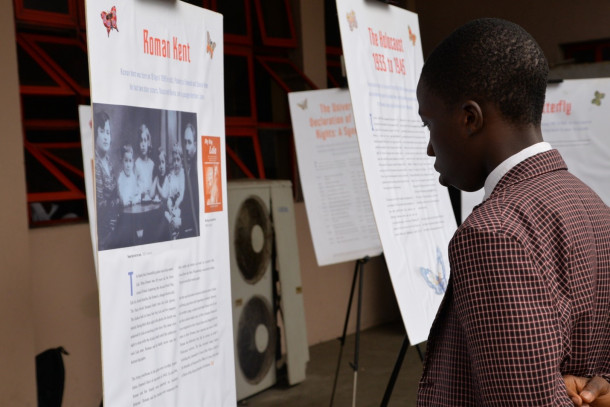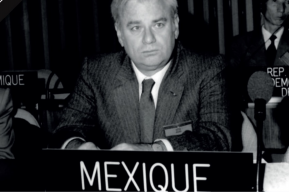Article
Holocaust education: UNESCO, the UN and the World Jewish Congress organize briefing for Permanent Missions and Delegations

The Holocaust was a watershed event with wide reaching consequences that continues to reverberate around the world. The United Nations was established in response to the horrors of the Holocaust and the Second World War, and a desire to protect future generations from “the scourge of war”. The United Nations' founding mission remains critically relevant today. Holocaust distortion and denial and other expressions of antisemitism, racism and prejudice continue to grow. Recognizing the significance of Holocaust education and remembrance in challenging antisemitism and prejudice, UNESCO and the United Nations remain committed through their global programme to promote Holocaust remembrance and education across all regions.
On 23 February, UNESCO and the United Nations’ Holocaust and the United Nations Outreach Programme and organized together with the World Jewish Congress a virtual briefing for permanent and observer Member States of the United Nations, UNESCO Permanent Delegations and Permanent Delegations to the United Nations at Geneva.
Over 80 representatives of these offices attended the closed briefing that included two panel discussions with international experts.
Peter Hayes, Professor emeritus of history at the Weinberg College of Arts and Sciences at Northwestern University and Chair of the Academic Committee of the United States Holocaust Memorial Museum outlined the legacy of the Holocaust for today’s international community.
Stefanie Schüler-Springorum, Director of the Center for Research on Antisemitism, and Director of the Selma Stern Center for Jewish Studies Berlin-Brandenburg, explained how antisemitism facilitated the Holocaust and how the same stereotypes employed by the Nazis with deadly effect appear in contemporary expressions of antisemitism, in conspiracy theories and are no less dangerous as they fan hate speech and prejudice...
Experts from the field of Holocaust education, from India, Israel, South Africa and the United States, shared their experience and recommendations of Holocaust education in a global context. Navras Afreedi from Presidency University in Kolkata, India, Richelle Budd Caplan from the International School of Holocaust Studies of Yad Vashem, Israel, Tad Stahnke from the U.S. Holocaust Memorial Museum, United States and Tali Nates from the Johannesburg Holocaust and Genocide Center, South Africa, and highlighted the relevance Holocaust education held for their respective regional contexts, and globally.
UNESCO and the United Nations Holocaust Outreach Programme and frame Holocaust education and remembrance as being of contemporary relevance, and necessary to achieving the aim of preventing future genocide. Alice Wairimu Nderitu, United Nations Special Adviser on the Prevention of Genocide, and Menachem Rosensaft, General Counsel and Associate Executive Vice President, World Jewish Congress and closed the virtual briefing with an appeal to Delegates to recognize the fragility of present-day societies and the need to strengthen education and awareness about past and present dynamics to fight antisemitism and prejudice and prevent genocide.
UNESCO and the Holocaust and the United Nations Outreach Programmed are mandated by General Assembly resolutions to deepen an awareness of the historical significance of the Holocaust and the dynamics that may lead societies to fall into group-targeted violence and atrocity crimes, and encourage action to challenge contemporary manifestations of racism, antisemitism and prejudice. Educational activities include commemorative events, capacity building workshops, and the development of guidance materials and educational resources for policymakers and educators in all regions.
- UNESCO’s work on education about the Holocaust and Genocide




